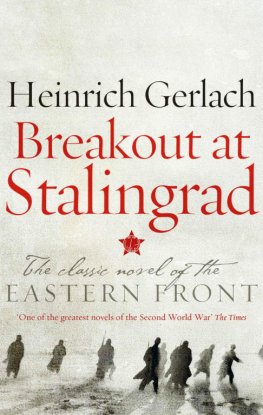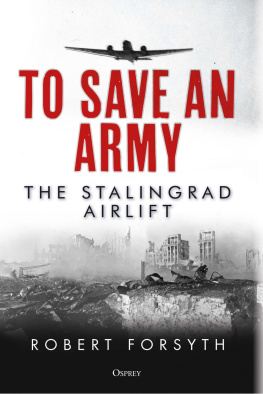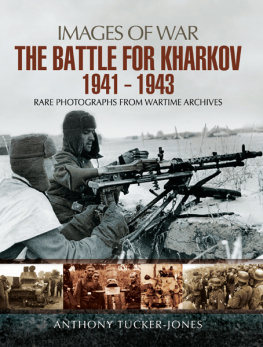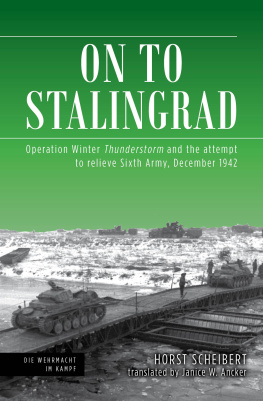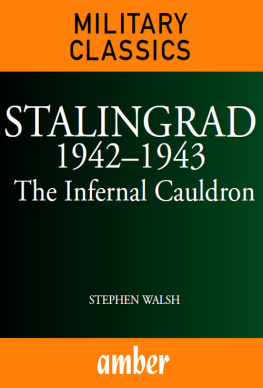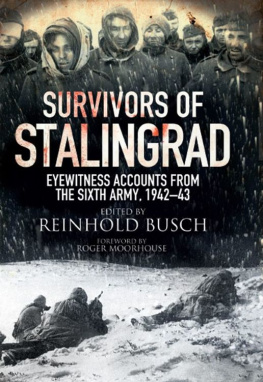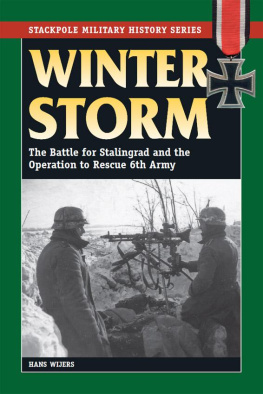Heinrich Gerlach
BREAKOUT AT STALINGRAD
With an Appendix by Carsten Gansel
Translated from the German by Peter Lewis
Mortuis et Vivis
To the Dead and the Living
First, a word about the novels title: although the German Durchbruch most commonly translates into English as Breakthrough, I have instead chosen to render it as Breakout. Heinrich Gerlach tells his story almost exclusively from the perspective of the officers and men of a German Wehrmacht unit trapped in the cauldron or pocket of Stalingrad in the winter of 194243, and much is made of the fear that the Red Army might break through the German perimeter and annihilate them (a fear that is never actually borne out). It was to avoid any suggestion that this potential Russian breakthrough was the main focus of the novel that I opted for the less obvious translation; Breakout alludes to a suicidal plan mooted by some of the Wehrmacht unit (but again, never realized) to try to burst out through the Russian encirclement and reach the safety of the main German front hundreds of kilometres to the west.
One way in which Gerlach puts across the desperate plight of his band of brothers at Stalingrad is through an abrupt switching in his narrative from the past to the present tense an effective method of conveying the raw immediacy of events, in particular the terrifying suddenness and confusion of combat. I was keen to retain these tense changes, both in order to do justice to the power of the authors original text and because they are a key feature distinguishing Gerlachs Ur-manuscript from the one he reconstructed after hypnotherapy, which formed the basis of his 1957 bestseller The Forsaken Army. Another touch of verisimilitude is the authors liberal use of Landserdeutsch German infantrymens slang; to try to capture the flavour of this argot, I have used corresponding words and phrases that would have been common among British troops of the same period (the Real McCoy, skedaddle, Elsan gen, lah-di-dah, swanning about, etc.).
The flow of the narrative is all-important, so I was concerned not to overburden the text with explanatory annotations. Much of the terminology of the Second World War and the Third Reich is already common currency in the Anglophone world thanks to oft-repeated documentary series and war films. I therefore confined myself to glossing only abstruse references to military hardware or to aspects of German culture that would otherwise have eluded English readers.
PETER LEWIS
Oxford, November 2017PART 1
The Gathering Storm
Winter had sent out its reconnaissance parties into the brown steppe between the Volga and the Don. The unseasonal warmth of the first days of November had, by the sixth, given way to a snowless frost that froze the mud on the endless tracks as hard as asphalt. Along this pleasingly smooth, firm new surface sped a small grey car, lively as a colt that had bolted from its stable. It was coming from the great depression to the south, where the general staffs and the supply trains for the German units fighting to take Stalingrad had dug in, and heading for the railway station at Kotluban. The driver, so heavily muffled in winter clothing that all one could see of him were a pair of crafty eyes gazing out at the world and a red snub nose, gave the little vehicle free rein. Despite having a very poor view of the road ahead through the iced-up windscreen, hed even occasionally take his hands off the wheel and quickly tug off his thick hopsack mittens to rub his cramped fingers. In peacetime, hed been a long-distance lorry driver, adept at handling six- or eight-tonners, so he felt entitled to take liberties with this dinky little Volkswagen saloon.
The officer in the front passenger seat was also feeling the cold, even through his padded greatcoat and two rugs. He drummed his feet in alternating rhythms on the floor of the car and against the metal door panel.
Christ, its cold! he muttered through his teeth, which were clenched on a cigar. You could freeze to death in this crate.
Thats the fault of the rear engine, Lieutenant, the driver replied through his woollen balaclava. The civilian versions much better. The exhaust gases warm it up inside.
Ha, thats cold comfort right now! laughed his passenger. Try lighting up this nose-warmer, then, he said, fishing a cigar from the recesses of his multiple layers of clothes and shoving it into his travelling companions mouth. Its exhaust gases arent to be sneezed at either! Besides, we shouldnt be so ungrateful. At least, I dont know how Id have made it through the quagmire of the Ukraine or the Kalmyk Desert if I hadnt been bucketing about in this friendly old jalopy. Bet its manufacturers couldnt have imagined wed still be needing it in the Russian winter, thats for sure.
Them and us both, Lieutenant and this is the second winter already.
And hopefully the last, Lakosch! Even Ivans bound to run out of steam sometime.
The driver, Lakosch, took a long drag on his cigar and squinted at the officer sitting beside him, sizing him up. First Lieutenant Breuer, a reservist and third general staff officer who had only come to head up Section Ic the Intelligence Unit a few weeks ago, was certainly more approachable than his predecessor, a regular army captain whod been a stickler for non-fraternization between officers and men. Even so, they still barely knew one another, so best tread carefully. Lakosch liked what he saw; the man had a pleasant air about him. So he hazarded a question that had been bothering him for days:
Is it really true, Lieutenant, that the divisions about to be stood down?
If youre cooped up in the same car day after day, bumbling through enemy territory avoiding any pitfalls, and if youre sharing the same filthy dugout and eating from the same mess tin, then theres not much room for secrets any more, even those officially stamped confidential. The officer looked at Lakosch out of the corner of his eye for a while and then burst out laughing.
Trust you to get wind of that, you smart alec! Yeah, its true all right. As soon as weve completed our new assignment up in the Don River elbow, were off to winter quarters in Millerovo. But dont go shooting your mouth off about it beforehand, dyou hear?
Then surely well get some more home leave too?
Breuer tightened the scarf round his neck and said nothing. Leave He hadnt seen his wife and children in over a year. The field hospital where hed spent more than six weeks fasting while recovering from dysentery had put in an urgent request that he be granted a spell of home leave to recuperate.
No chance, Breuer! the general had told him. Right now we need every last man, maybe even over Christmas. Go and lie down in your bunker and try to take it easy!
As if taking it easy was even an option around Stalingrad! After a long series of battles in which they sustained heavy casualties, the two grenadier regiments had finally managed to capture the tractor factory and had pushed forward almost to the banks of the Volga. Now the companies, which by this time were uniformly only eight to fifteen men strong and bereft of almost all their officers, were strung out in a thin line along the crest of the steep riverbank. Crawling with lice and caked with filth, freezing and utterly exhausted, theyd already waited for weeks to be relieved, exposed to constant bombardment by Russian artillery and mortars. And the few poorly trained replacements theyd been sent were picked off like flies by snipers. Down at the foot of the bluffs, the Russians were clinging on like barnacles; not even repeated dive-bombing by Stukas could dislodge them. Night after night, they received reinforcements from across the river and kept launching counter-attacks, which inflicted even more losses on the crippled German division. What was it Hitler had once said? Id rather hold Stalingrad with a few small combat patrols! Yeah, small combat patrols that was about all that was left now! Take it easy, pah! And where was he supposed to do that? In Stalingrad, which was daily being steadily reduced to a pile of rubble by a hail of bombs and artillery salvos, or maybe at the POW assembly points behind the lines, or among the regimental and battalion staffs who were holed up in some basement or other, never seeing the light of day? Only the incessant nights of bombing in that foxhole in Gorodishche had been worse Well, at least that was now in the past. The division had been withdrawn from there. The tank regiment, artillery and other units were already on the move, and the grenadier regiments were shortly due to follow. Off to winter quarters! Then, and only then, might there be some point in speculating about home leave.

